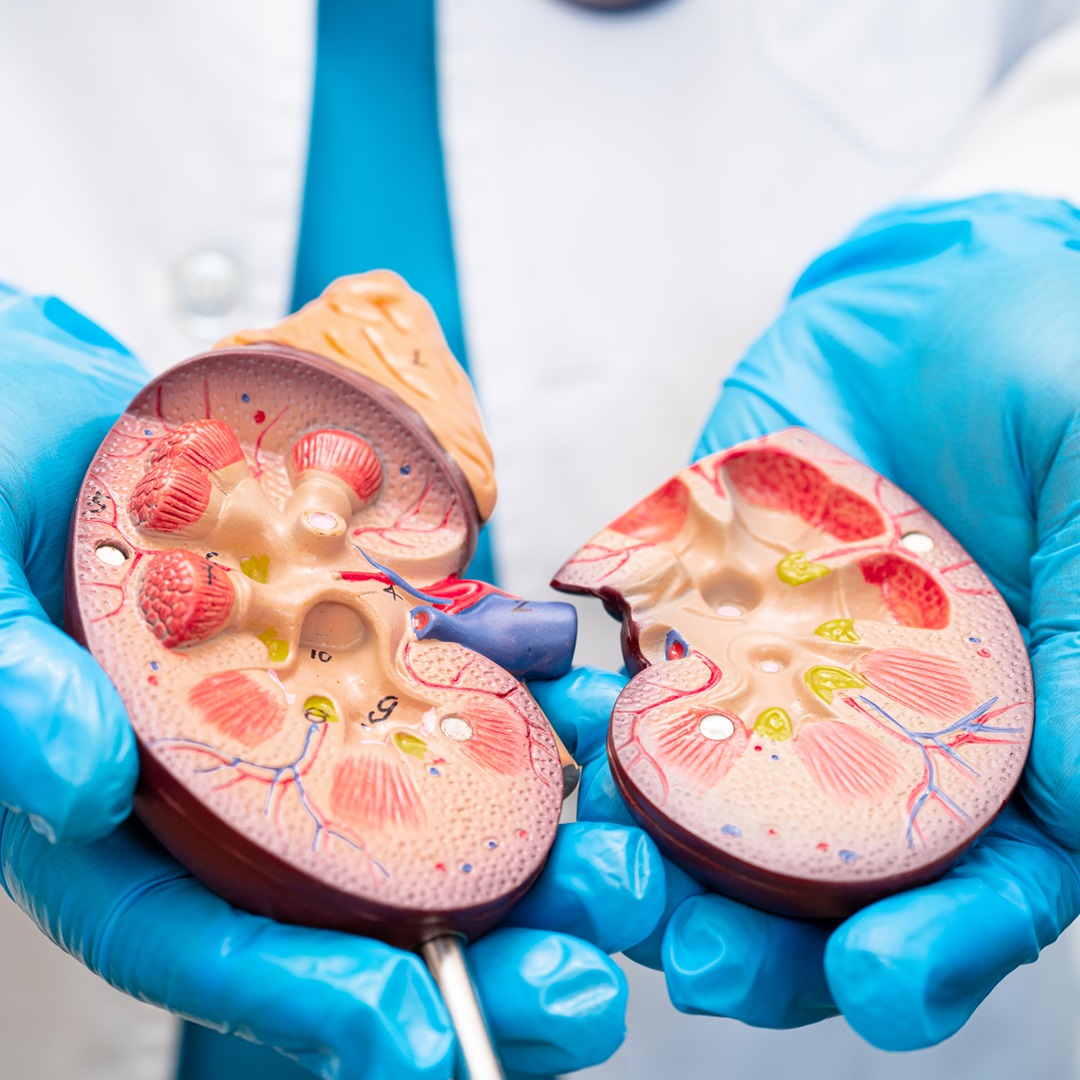by Stephen Luther, M.D.
Share

Kidney stones, or nephrolithiasis, are a rising global health challenge, impacting roughly one in 11 people in the United States. These agonizing crystalline deposits emerge in the kidneys when substances like calcium, oxalate, and uric acid concentrate beyond their solubility limits in urine, forming solid masses.
The process is complex, but a compelling connection exists between metabolic disorders – such as prediabetes – and the onset of kidney stones. Much like how damaged blood vessels invite plaque in atherosclerosis, metabolic imbalances in the kidneys can trigger excessive calcium uptake and stone development.
How Kidney Stones Form: A Metabolic Perspective
Kidney stones start with urine supersaturation, where stone-forming elements exceed their dissolving capacity. Calcium oxalate stones dominate, making up about two-thirds of cases, with calcium phosphate and uric acid stones following. This mirrors vascular plaque buildup: metabolic dysfunction sets the stage for mineral deposition. In the kidneys, this involves skewed handling of minerals and shifts in urinary chemistry, often tied to conditions like prediabetes and metabolic syndrome.
Prediabetes, marked by fasting blood sugar levels of 100–125 mg/dL, undermines insulin sensitivity – a critical factor in stone risk. When insulin falters, the kidneys struggle to generate ammonium, resulting in acidic urine with a low pH. This acidity encourages uric acid crystals to form and hampers citrate, a natural shield against stones, from binding calcium, paving the way for calcium oxalate deposits. Metabolic syndrome, a constellation of issues including excess belly fat, high blood pressure, and poor lipid profiles, doubles this risk. Obesity and elevated glucose levels drive up urinary excretion of calcium, oxalate, and uric acid, creating a perfect storm for stone formation.
Gut absorption of calcium, often heightened by metabolic disease, adds another layer. In prediabetes, insulin resistance can boost calcium uptake from the intestines, while inflammation tied to obesity disrupts oxalate processing, leaving more of it free to pair with calcium in the kidneys. Conditions like chronic kidney disease or gut disorders further concentrate these substances by reducing urine output.
Lifestyle Factors Increasing Metabolic Risk
Certain lifestyle choices fuel the metabolic fire behind kidney stones, echoing their role in heart disease:
- Poor Diet: inadequate sodium, and sugary drinks can elevate urinary calcium and uric acid while acidifying urine. Yet, skimping on dietary calcium paradoxically increases stone risk by letting unbound oxalate flood the gut.
- Sedentary Habits: Inactivity breeds obesity and insulin resistance, both stone promoters, while slowing fluid turnover and concentrating urine.
- Inadequate Hydration: Low water intake is a cornerstone of supersaturation, intensifying calcium, oxalate, and uric acid levels.
- Obesity: Visceral fat churns out inflammatory signals that impair insulin and boost oxalate in urine, nurturing stone growth.
- Stress and Sleep Issues: Persistent stress and disrupted sleep worsen insulin resistance and hormonal balance, subtly tilting the scales toward stones.
These habits don’t just harm the kidneys – they foster a systemic state ripe for calcium buildup, akin to cholesterol clogging compromised arteries.
Animal-Based Diets: Not the Metabolic Villain
Despite popular belief, animal-based diets – rich in meat, eggs, and dairy – aren’t the metabolic menace they’re often painted to be. The assumption that high protein from animal sources directly fuels kidney stones or worsens prediabetes overlooks the bigger picture. In reality, these diets can bolster metabolic health when paired with smart choices. By cutting carbs, they stabilize blood sugar and ease insulin demand, countering the acidic urine and citrate deficits tied to prediabetes. Far from overloading the kidneys, protein from animal foods supports efficient mineral handling in healthy systems, provided hydration keeps pace. The real culprits – sugar-laden drinks and processed carbs – spike uric acid and insulin resistance far more than a steak ever could. With ample water and balanced calcium from dairy, animal-based eating can align with kidney health, not undermine it.
Solutions and Preventative Measures
Preventing kidney stones hinges on tackling metabolic health and urinary balance. Proven steps include:
- Hydration: Target 2.5–3 liters of fluid daily to yield at least 2 liters of urine, diluting stone-prone substances. Water reigns supreme, but citrus drinks like lemonade elevate citrate to block stones.
- Dietary Tweaks: Boost calcium to 1000–1200 mg daily from food (think dairy) to trap oxalate in the gut; cut back on oxalate-heavy items like spinach or rhubarb if calcium oxalate stones are a concern; and ditch sugary beverages for water or low-sugar options to curb uric acid.
- Weight Control: Shedding 5–10% of body weight enhances insulin sensitivity, trims urinary calcium, and slashes stone recurrence.
- Exercise: Aim for 150 minutes of moderate movement weekly, like brisk walking, to fight obesity and lift metabolic wellness.
- Medical Options: For those at high risk, doctors might prescribe thiazide diuretics to lower urinary calcium or potassium citrate to alkalinize urine and raise citrate.
These steps don’t just fend off stones – they tackle the metabolic roots tying kidney health to broader diseases like diabetes and hypertension.
Pioneering Prevention Through Precision Screening
Symbios Health’s elite lab facility equips individuals to master their kidney health with innovative screening and custom prevention plans. Recognizing that metabolic and lifestyle risks vary by person, our advanced tools deliver pinpoint accuracy. Here’s our approach:
- Comprehensive Metabolic Screening: We analyze blood and 24-hour urine samples for markers like calcium, oxalate, uric acid, citrate, and pH. For prediabetes or metabolic syndrome cases, we assess insulin resistance, glucose, and lipids to reveal stone triggers.
- Calcium Buildup Detection: Advanced imaging and supersaturation indices spot early calcium deposits, enabling preemptive action.
- Lifestyle Profiling: We dissect diet, hydration, and activity habits to identify specific risks.
- Tailored Prevention Plans: Screening results shape practical strategies – custom diets, hydration targets, or exercise routines – to minimize stone odds.
- Ongoing Monitoring: Regular check-ins track metabolic progress, refining plans to prevent recurrence.
By merging top-tier diagnostics with lifestyle insights, Symbios Health links metabolic disease to kidney stone prevention, offering a proactive wellness path.
Kidney stones aren’t just a kidney quirk – they reflect deeper metabolic imbalances, much like plaque in battered blood vessels. Prediabetes and metabolic syndrome heighten this risk by skewing kidney function, ramping up calcium absorption, and fostering stone-friendly urine. Through hydration, smart eating, weight loss, and movement, people can slash their risk. Symbios Health leads the charge with elite screening and personalized plans to detect and halt calcium buildup, empowering individuals to protect their kidneys and sidestep stone pain. By targeting the metabolic core of this condition, we chart a course to a healthier, stone-free tomorrow.





